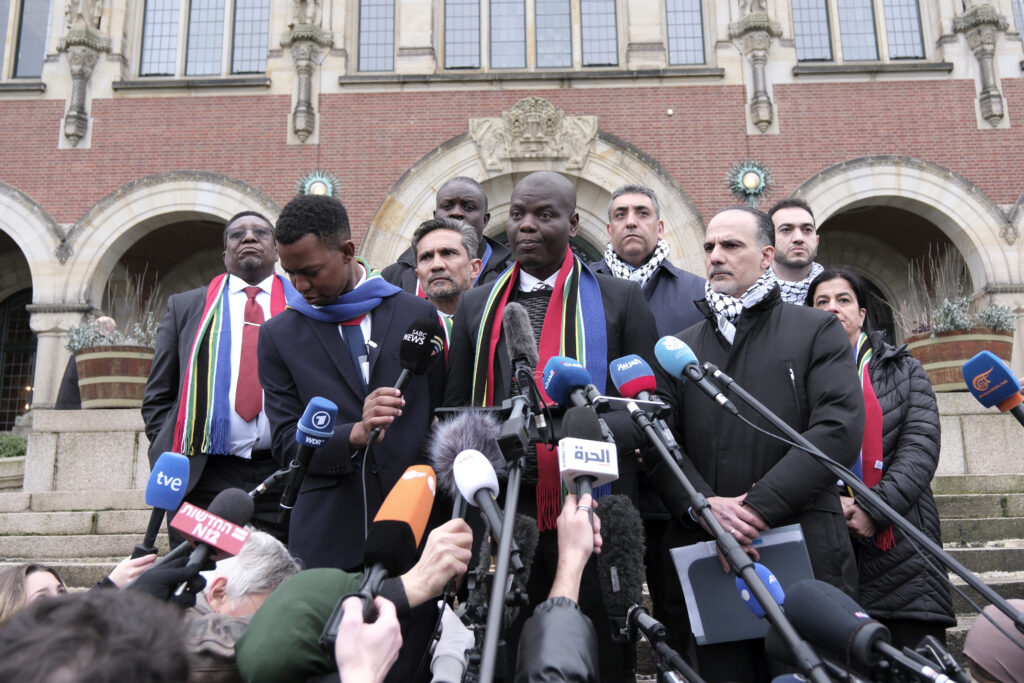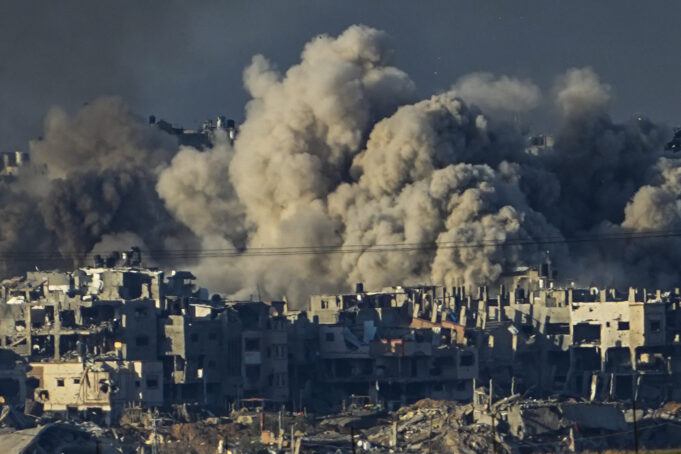Two days of hearings concluded on Jan. 12 at the International Court of Justice at The Hague in a case the Republic of South Africa brought against the Zionist State of Israel on genocide charges. South Africa with wide global support said Israel has breached the Geneva Convention on Genocide in its war on the Palestinian resistance raging since October 2023.
Worldwide attention was on the chambers of the Peace Palace that houses the International Court of Justice (ICJ) on Jan. 11 and 12. The court is the highest judicial body of the United Nations. Lawyers representing South Africa used public statements and video evidence of Israeli leaders, and detailed accounts of events they argued proves intent.
“The evidence of genocidal intent is not only chilling, it is also overwhelming and incontrovertible,” South African legal scholar Tembeka Ngcukaitobi told the court. Mr. Ngcukaitobi said many propagators of grave atrocities protest that they were misunderstood, did not mean what they said, or their own words were taken out of context. “What state would admit to a genocidal intent?” he asked rhetorically. “Yet the distinctive feature of this case has not been the silence as such, but the reiteration and repetition of genocidal speech throughout every sphere of state,” said Mr. Ngcukaitobi.
He said genocidal inciters include the prime minister, the president, the Minister of Defense, the Minister of National Security, the Minister of Energy and Infrastructure, members of the Knesset, senior Army officials, and foot soldiers. “Genocidal utterances are therefore not out in the fringes,” he argued. “They are embodied in state policy.”

Israel’s lawyers dismissed the damning statements played and read out as rhetoric without legal significance. Flipping the script, they argued that they are the victims of genocide acting in self-defense.
“We stand by the facts, the law and all the evidence we have submitted,” Ronald Lamola, South Africa’s Minister of Justice, told reporters on the court steps, after Israel’s three hours of rebuttal. He said South Africa is confident about the facts they presented showing Israel is in violation of the Genocide Convention. Mr. Lamola said the State of Israel has failed to disprove South Africa’s case.
Although legal experts say transnational cases can take years to resolve, South Africa requested the World Court to order Israel to “immediately suspend its military operations in and against Gaza.”
The case itself is historic.
“I think the South African government has made a very powerful case, very documented case,” said Brian Becker, executive director of the Act Now To End War and Racism Coalition (ANSWER).
The lawyers didn’t have to reach very far, he told The Final Call, because the South African dossier basically pointed to statements Israeli government officials openly said in what can be described as genocidal policy.
“So, it’s kind of hanging the Israeli war criminals with their own words, because their own words are explicitly genocidal, and we saw that,” said Mr. Becker.
Some noted the historic nature of the move of South Africa taking the point against Israel’s oppression, genocide and forced displacement at the ICJ.
Ajamu Baraka of the Black Alliance For Peace told The Final Call a number of nations commented that what is happening in Gaza is in fact genocide but it needed the “right” nation to bring it to the forefront before the world.
“Making that comment and engaging in a formal process that would have Israel and by extension Israel’s enabler, the United States of America, to call them out in a public international forum and international process, are two different things,” he said.
“So, there have been reluctance to take more formalized positions on this issue. That’s why it was important that the right nation took the lead on this,” reasoned Mr. Baraka. “South Africa is the perfect nation,” he added.
It was the last officially recognized apartheid regime and maintained strong opposition to the apartheid regime in Israel. In addition, South Africans, including individuals in government, remember that Israel was a staunch ally of the brutal White apartheid regime in South Africa.
“So, by them taking this lead, it provides not only a political, but a moral stance on where the international community should be,” explained Mr. Baraka.
Some note that an African nation stepped up once again to file charges at the ICJ. South Africa’s stance was redolent to when The Gambia, West Africa, allied with the Organization of Islamic Cooperation brought genocide charges against Myanmar, in 2019. The Gambia charged that crimes against the Rohingya Muslims in Myanmar’s Rakhine State violated international laws against genocide. As a targeted ethnic minority within a country in constant flux, the Rohingya have been persecuted, marginalized, exiled as stateless refugees, and scattered throughout Southeast Asia.
South Africa utilizing the World Court is part of mitigating a global demand for justice.
The Honorable Minister Louis Farrakhan, National Representative of the Most Honorable Elijah Muhammad of the Nation of Islam, has described this world demand as an intensifying “universal cry for justice,” and he warned that all tyrants will be removed today by God Himself.
The Minister spent decades calling the nations to a posture of balance and warning about the consequences of unbridled oppression.
Echoing his teacher, Minister Farrakhan stated that justice will ultimately come from the God of justice and cautioned tyrannical nations will be requitted for their deeds and every nation will be called to its record. On that day everyone will be requited for what they did, Minister Farrakhan pointed out in Part 15 of a yearlong lecture series called, “The Time And What Must Be Done,” in 2013.
“So as the Honorable Elijah Muhammad said that ‘the principle of justice’ will be ‘the weapon’ that God will use in ‘the Day of Requital,’ or, ‘the Day of Judgment,’ then this is ‘a bad day,’ then, for the wicked—a very bad day,” said Minister Farrakhan.
“What is the recompense for those who administer ‘suffering’ and ‘loss’? Jesus mentioned this ‘Law of Requital’ in these words found in the Book of Galatians, Chapter 6, verse 7: ‘Be not deceived; God is not mocked: for whatsoever a man soweth, that shall he also reap,’” said Minister Farrakhan.
From the Bible Book of Hosea, Chapter 8, verse 7, Jesus said if you “sow the wind” you will “reap the whirlwind”—because Nature never gives you “exactly” what you gave,” he said. “Nature always gives you more; so if you’ve done ‘good,’ God will give you more than the good that you have done,” explained the Minister.
“But for the ‘evildoer’: God will bring recompense on your head. And for the wicked who persist in evil: Oh, this ‘whirlwind’ is now blowing at your door!” he warned.
Israel’s day of requital appears to have arrived, say some observers.
When news dropped that South Africa was taking the occupier Zionist State to the ICJ it was welcomed news to activists and change agents.
In the days before the ICJ hearing, support for Israeli accountability swelled. Governments, scholars, and international legal experts and organizations co-signed in overwhelming numbers support of South Africa. Iran expressed support and cautioned the ICJ to treat the case objectively and avoid caving in to any pressure the U.S. might exert on the process to favor Israel.
“We hope and want the International Court of Justice to impartially investigate the complaint of South Africa and some other governments against the Zionist regime regarding the crime against the people of Gaza and not to give in to the political and non-political pressures of the U.S.,” Iranian Foreign Ministry spokesman Nasser Kan’ani said on Jan. 11.
In a statement on Jan. 10, the ministry called for strong international support and reiterated for Palestinians struggling against occupation, that resistance is a legitimate right recognized by international law.
The Iran based Parliamentary Union of the Organization of Islamic Cooperation (PUIC) lauded South Africa’s action at an emergency session in Tehran. A Jan. 10 final communiqué exhorted members and the international community to fully condemn Israel’s crimes against humanity and genocide.
“We want the international community to fully take up its responsibility to condemn these measures and try to put an immediate end to the aggression,” the communiqué said. It also condemned U.S. “participation in the aggression” whether through “direct participation” by supplying advanced war-ware, “protecting the Israeli entity” or “covering up its crimes” at international forums. Representatives from 26 Islamic and Asian countries, including Bahrain, Turkey, Algeria, Oman and China, attended the PUIC meeting.
Nearly 850 scholars co-signed a public statement of support published in Third World Approaches To International Law Review (TWAILR). The statement said South Africa’s submission to the ICJ provides an opportunity to judge the highly charged debates regarding Israel’s ongoing genocide within a legal framework.
“In this spirit, we reiterate our support for South Africa’s submission to the ICJ as a clear demand to the international community to prioritize accountability, end genocide, reject impunity, and uphold human rights for all,” said the statement.
The ICJ was established in 1945 as the highest judicial organ of the United Nations. The ICJ settles disputes between nations and is different from the younger International Criminal Court (ICC), established in 2002, that tries individuals.
The court did not indicate the time for a decision. South Africa requested an expedited process, meaning instead of months or years, it may perhaps be weeks.
“If that happens, then this will be historic and it will really put incredible political pressure on Israel and their backers in the United States of America,” said Mr. Baraka. “And it would complete the process of completely delegitimizing the Israeli regime,” he added.













